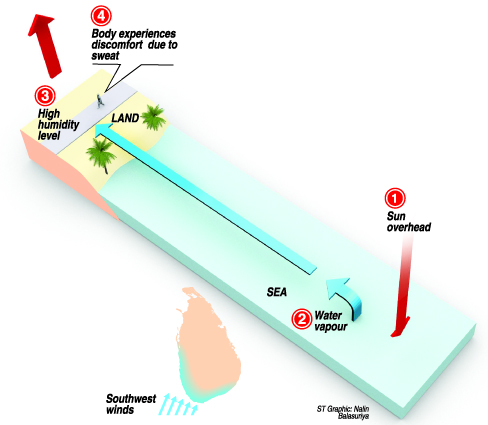News
Mighty monsoon slows to a worrying trickle
The intermittent monsoon rains may come as a breath of fresh air but the Met Department fears that sweaty days and uncomfortable nights will continue due to the humidity with little respite even from passing showers in the coming days.

Cooling thambili: A man quenches his thirst with the most sought after drink these days
The department warns of less rain due to a weaker monsoon the result of El Niño – a warm band of ocean current across the tropical Pacific Ocean which drives up ocean temperature by a few degrees, causing floods, droughts and other atmospheric disturbances in many regions.
S.R. Jayasekare, Deputy Director (Forecasts) and the head of the climate change studies division of the Meteorology Department, said low rainfall was experienced both in the north-east monsoon from November last year to this February and the March-April inter-monsoonal period, and this could continue during the south-west monsoon from May to September.
“The monsoon should be fully established by last week of May. But there is a slight delay and this is an indication of less rainfall although the south-west monsoon usually brings heavy rains to the south-western parts of the country,” he said, adding that despite any rainfall there would be high humidity levels as the ocean surface had warmed up.
 He said that with the El Niño developing later this year there was a possibility of disturbed weather conditions such as high temperatures and less rainfall.
He said that with the El Niño developing later this year there was a possibility of disturbed weather conditions such as high temperatures and less rainfall.
The Central, Sabaragamuwa, Western and Southern provinces are to receive rains from next week with the onset of the monsoon while thundershowers are expected in the Uva, North-Central and Eastern provinces in the afternoon or evening. Strong winds are forecast for the central hills.
The irrigation, agriculture and electricity generation sectors are concerned over indications of a weak monsoon season.
Irrigation Department Director-General Badra Kamaladasa said the recent rains were not providing adequate water for reservoirs and irrigation tanks.
“The dry spell has been continuing since last November. Paddy cultivation is severely affected in Ampara, Kurunegala, Vavuniya and some parts of the North Central Province.
“The Irrigation and Agriculture Departments are working together on educating farmers to switch to cash crop cereals such as soya and green gram as the upcoming Maha paddy season will be severely hit if this monsoon brings less rain,” she said.
Ms. Kamaladasa said the continuous weak monsoons had already affected the Yala season and will have an adverse impact on the country’s major growing season, Maha. The paddy output is much less than that of last year, she said.

Beating the heat to get a job of work done
Out of the total electrical power generated, hydropower currently contributes only 12.9 per cent while 83.8 per cent is generated by thermal power, the Ceylon Electricity Board said. The CEB’s thermal (coal and oil) power plants generate 36.55 and 47.27 per cent respectively.
M.C.Wickremasekare, acting General Manager of the Ceylon Electricity Board, said the CEB was bearing a huge cost for thermal power generation as there had not been adequate rain since the end of last year.
“Seeing two failed monsoons and another failed monsoon on the way is very worrying for the CEB. We have not decided to go for power cuts yet but if this adverse weather continues the CEB has to seek such options,” he said.
Dr. Rekha Nianthi, a senior lecturer in the department of geography at the University of Peradeniya, said the state needed to work and invest more on the National Climate Change Adaptation Strategy.
“A long dry period is a pattern that may be experienced regularly in the coming years. This time it has affected the paddy, tea, coconut, rubber and vegetable plantations as well as the energy sector,” she said.
Dr. Nianthi said that the state, with the support of non-government agencies, should commit to the protection of forests, aid paddy farmers to grow alternative cash crops, avoid resettlement in catchment/reservoir areas, invest in building tanks and promote rain water/drainage water harvesting.

